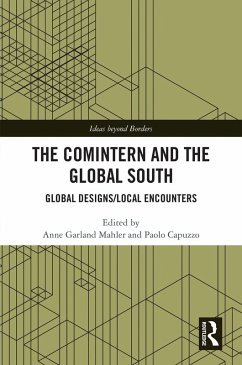
Marxist Historiographies (eBook, ePUB)
A Global Perspective
Redaktion: Wang, Q. Edward; Iggers, Georg G.
Versandkostenfrei!
Sofort per Download lieferbar
44,95 €
inkl. MwSt.
Weitere Ausgaben:

PAYBACK Punkte
22 °P sammeln!
Marxist Historiographies is the first book to examine the ebb and flow of Marxist historiography from a global and cross-cultural perspective. Since the eighteenth century, few schools of historical thought have exerted a more lasting impact than Marxism, and this impact extends far beyond the Western world within which it is most commonly analysed.Edited by two highly respected authors in the field, this book deals with the effect of Marxism on historical writings not only in parts of Europe, where it originated, but also in countries and regions in Africa, Asia, North and South America and t...
Marxist Historiographies is the first book to examine the ebb and flow of Marxist historiography from a global and cross-cultural perspective. Since the eighteenth century, few schools of historical thought have exerted a more lasting impact than Marxism, and this impact extends far beyond the Western world within which it is most commonly analysed.
Edited by two highly respected authors in the field, this book deals with the effect of Marxism on historical writings not only in parts of Europe, where it originated, but also in countries and regions in Africa, Asia, North and South America and the Middle East. Rather than presenting the chapters geographically, it is structured with respect to how Marxist influence was shown in the works of historians in a particular area. This title takes a dual approach to the subject; some chapters are national in scope, addressing the Marxist impact on historical practices within a country, whereas others deal with the varied expressions of Marxist historiography throughout a wider region.
Taking a truly global perspective on this topic, Marxist Historiographies demonstrates clearly the breadth and depth of Marxism's influence in historical writing throughout the world and is essential reading for all students of historiography.
Edited by two highly respected authors in the field, this book deals with the effect of Marxism on historical writings not only in parts of Europe, where it originated, but also in countries and regions in Africa, Asia, North and South America and the Middle East. Rather than presenting the chapters geographically, it is structured with respect to how Marxist influence was shown in the works of historians in a particular area. This title takes a dual approach to the subject; some chapters are national in scope, addressing the Marxist impact on historical practices within a country, whereas others deal with the varied expressions of Marxist historiography throughout a wider region.
Taking a truly global perspective on this topic, Marxist Historiographies demonstrates clearly the breadth and depth of Marxism's influence in historical writing throughout the world and is essential reading for all students of historiography.
Dieser Download kann aus rechtlichen Gründen nur mit Rechnungsadresse in A, B, BG, CY, CZ, D, DK, EW, E, FIN, F, GR, HR, H, IRL, I, LT, L, LR, M, NL, PL, P, R, S, SLO, SK ausgeliefert werden.













